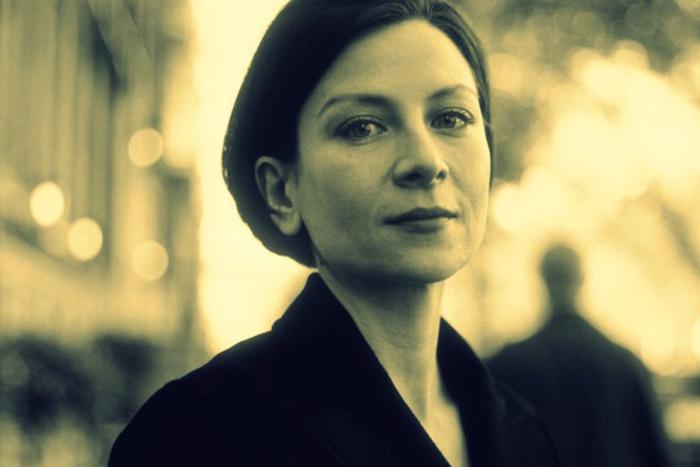I have spent more time this week in hotel rooms, bars, and lobbies than in the movie theaters where the Toronto International Film Festival is ostensibly held. Last year, I covered the festival pro bono, successfully maintaining the illusion that TIFF could be experienced as an unadulterated cinephilic paradise by simply watching anything I fancied and writing in leisure about whatever I liked. This year, I am a responsible member of the occasionally commercial workforce, and I have had interviews to conduct. Lots of them. Up against the studied nonchalance of some of the seasoned critical veterans, it’s hard sometimes not to feel like a bumbler. It’s a tricky rhythm to adapt to.
The best film I have seen at the festival thus far, however, of the generally meager lot I’ve sampled, is Jonathan Glazer’s strange and sublime science-fiction drama Under the Skin, which adopts the bemused perspective of an alien struggling to understand the human world around her. The film, a marked improvement over Glazer’s already great Birth and Sexy Beast, unfurls with uncommon patience and curiosity, and its perception of humanity as fundamentally absurd is so compelling that it becomes difficult to leave the theater feeling quite the same way. I felt more receptive to discomfort in the presence of both bona fide celebrities and the often sprawling posses of publicists and assistants who accompany them—what was I among them, after all, if not an alien of sorts adrift where I didn’t belong, doing my best to keep up but failing to really understand? The system by which all high-profile interviews are organized is rigorous, and the people responsible for organizing these press days, often for three or four actors or directors at a time, are required to be like John Nash with timetables. Their precision is astounding.
Not that what is scheduled can possibly be adhered to. The real job of these master publicists is to reorganize and reschedule on the fly, as journalists arrive late or the talent talks long. Nobody tells you, when you arrive before your confirmed timeslot, that interviews are running a half hour behind schedule, because that kind of delay is assumed. Most TIFF interviews, particularly those handled by the biggest studios and publicity companies, are conducted in the Intercontinental Hotel on Front Street, which through the year serves ordinarily as a kind of grandiose business locale for conferences and meetings. Floors are booked off in blocks so interviewees can room-hop for added speed and privacy. Less important PR reps and interns can be found at all hours of the day sitting on the hallway floors, laptops in lap and BlackBerrys in hand, trying with a certain harried disposition to remember which actor is in which room with which journalist at any given time. On Monday I was ushered into a room to talk to Jesse Eisenberg for exactly nine minutes before being ushered out and onward once again.
Nobody simply enters or leaves a room in these hotels. They are only ever ushered. Later that same afternoon I was ushered from an opulent waiting room suite filled with espresso cups and mojito-flavored macarons downstairs two floors to Michael Fassbender’s room, where I was to speak for thirty minutes with Steve McQueen. McQueen directed what happens to be my other favorite film of the festival thus far, the Fassbender and Chiwetel Ejiofor-starring historical drama 12 Years a Slave. This is where the strained glamor of the interview circuit crosses the line from vaguely sleazy to sort of just gross. McQueen, who won the prestigious Turner Prize for visual art in 1999, is a serious artist and filmmaker, and his latest effort deals in a highly sophisticated way with slavery in America. We had a good, thorough discussion about the nature of slavery and the problems inherent in its depiction, but the conversation, however well-intentioned, was inflected thoroughout by the artificiality of the context. The luxury suite, the free amuse bouche, the chilled wine on the side table to his right—how could we sit here and talk about things like slavery and the atrocities of American history? How could I talk about any film seriously with any serious filmmaker in between free Diet Cokes and between-photo foundation touchups? The whole enterprise feels disingenuous, but this one in particular struck me as a betrayal of the film’s intensity and rigor. A cold, hard look at a story too-rarely told by American cinema, 12 Years surely deserves a more appropriate exegesis.
But that’s also what the film festival experience is all about. We make these concessions to industry standards because the event itself is founded on the practices of the industry. It is a sales and marketing event; the cinema in and of itself is peripheral. I’m granted access to these screenings and time with these actors and filmmakers because I can in some small way facilitate their promotion and sale. They want buzz and hype, which we are inevitably inclined to offer with enthusiasm. How many times, over the course of the festival’s first week, did I hear that a film was “an Oscar contender” or “a guaranteed hit“? And not from industry speculators or box office gurus, but actual film critics—people whose job it presumably is to unpack the work of artists, not expedite the transfer of cash from audience to studio. It’s a great honor to speak with somebody like McQueen or, say, Asghar Farhadi, whom I interviewed over the weekend and whose films I admire very much. But the surroundings are a constant reminded that my personal intentions are irrelevant. I am contributing to a process of sales management and marketing, and no matter how involved my questions, the result remains an advertisement. But I do enjoy the Diet Coke.
Check back for more TIFF coverage throughout the week.




